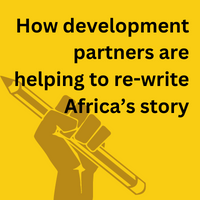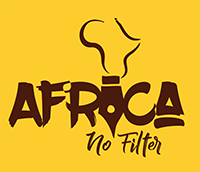How development partners are helping to re-write Africa’s story

![]()
Este blog fue publicado originalmente en el Africa No Filter website.
Slow news is the next big thing to hit the media world and it could be a solution to the fast pace and competitive nature of news in the digital age. But to Heba Aly, taking news slowly has proven to be the difference between the New Humanitarian and other news platforms. Where others rush to break news, the New Humanitarian, which covers conflicts, disasters, and other crises, puts communities first. And this doing so, putting ethics at the core of what stories are told and how they are told.
“It’s important for our journalists to prioritise the relationships we have in our community over being the first ones to report on breaking news,” Aly explained. Aly was speaking at Africa No Filter Presents: How to Write About Africa – Ethical Storytelling & Centering Equity webinar. It was inspired by Africa No Filter’s How to Write About Africa in 8 Pasos: An ethical storytelling handbook that’s aimed at rebalancing stereotypical narratives about Africa that persist in the development community.
Aly, who is the CEO of the New Humanitarian, was joined by Professor Relebohile Moletsane, a gender and education expert and the JL Dube Chair in Rural Education at the University of KwaZulu-Natal; storyteller and land rights activist Dimuna Phiri and Emily Renshaw-Smith, who is the head of content at Comic Relief. The conversation was moderated by ANF’s executive director, Moky Makura.
The panel unpacked ethics in storytelling, and why it’s important to centre them when writing about Africa – more so as development agencies work with vulnerable communities on issues that can be as sensitive as they are complex.
Telling stories ethically doesn’t mean ignoring “the bad things” that happen. It means valuing the dignity of people whose stories are being told.
“Ethical storytelling involves stories told by the people who experience the issues, who express how they express the issue, the way they experience the issue and using a medium or media they are familiar with,” Professor Moletsane explained. Her words were echoed by other panelists, who agreed that stories are best told by people and communities with lived experiences. Además, these stories should not just be seen as reporting, whether they are told to show impact or, in the case of traditional media, breaking news.
From this traditional model to telling stories, experiences are often told from a writer’s perspective or represented in a way that can be damaging and dangerous for people whose experiences are being reported. Además, stories tend to be framed through poverty, crises, poor leadership, corrupción, and disease. There is also no regard for socio-political and cultural dynamics.
To put ethics at the heart of how stories are told, the panelists said, consent, respect for human dignity, and agency need to be prioritised. This can be done by using language that’s empowering instead of victimising, Aly said. It gives agency to the people whose experiences are being reported. Además, Phiri added, social and cultural contexts should not be ignored in the story. In her case, it includes ensuring that women’s voices are not marginalised, even when communities have elected representatives to speak on its behalf. It also means letting communities lead how information is gathered and ultimately put together.
“Spend time in the community to understand issues and build trust,” Phiri said, adding that this can take a day, a week and as long as three months when Phiri needed to first get permission for the community royal and traditional leaders. Even then, she had to work with two locals.
Building trust isn’t just about getting permission. It’s about engaging in conversations and issues that are meaningful to people whose experiences are being shared. Professor Moletsane said this can only happen when assumptions and agendas are put aside when they are not in line with what the community considered their priority. In her case, a project about sexual violence turned into one about forced early marriages when the girls she was interviewing said their biggest concern was it affected their prospects for education and economic opportunities.
Renshaw-Smith said for Comic Relief, ethical storytelling also includes no longer using celebrities to tell the organisation’s impact stories. They now work with local storytellers, and the stories aren’t framed by poverty or told in a way that elicits pity. The question that determines their approach is, “how do we make sure there are emotional responses to films responding to joy, empathy and success? Can we make people angry instead of sad?”
The discussion of ethical storytelling – along with the handbook – is part of Africa No Filter’s mission of shifting stereotypical narratives of Africa. Ethical storytelling doesn’t negate or avoid staying true to the nature of a story. It is a call to action to tell stories with nuance, challenge the existing status quo that centres poverty and trauma without adding historic and cultural context, and ultimately co-create narratives with communities instead of treating them as a means to an end, whether it’s getting more funding or breaking news.
You can watch the webinar aquí. Download the Ethical Storytelling Handbook aquí.
SOBRE EL AUTOR
 Narrative matters and the prevailing one about Africa as a continent defined by conflict, disease, poor leadership, poverty and corruption is outdated and harmful. It has also become the single story of the continent, crowding out perspectives of Africa that show an equally creative, innovative and progressive place. Africa No Filter is working to shift stereotypical narratives of Africa by investing in Research, Community Building, Advocacy and Grant-making to storytellers as well as arts, culture and media organizations. It’s a donor collaborative funded by Ford Foundation, Bloomberg, Mellon Foundation, Luminate, Open Society Foundations, Comic Relief, the Hilton Foundation and Hewlett Foundation.
Narrative matters and the prevailing one about Africa as a continent defined by conflict, disease, poor leadership, poverty and corruption is outdated and harmful. It has also become the single story of the continent, crowding out perspectives of Africa that show an equally creative, innovative and progressive place. Africa No Filter is working to shift stereotypical narratives of Africa by investing in Research, Community Building, Advocacy and Grant-making to storytellers as well as arts, culture and media organizations. It’s a donor collaborative funded by Ford Foundation, Bloomberg, Mellon Foundation, Luminate, Open Society Foundations, Comic Relief, the Hilton Foundation and Hewlett Foundation.




Respuestas